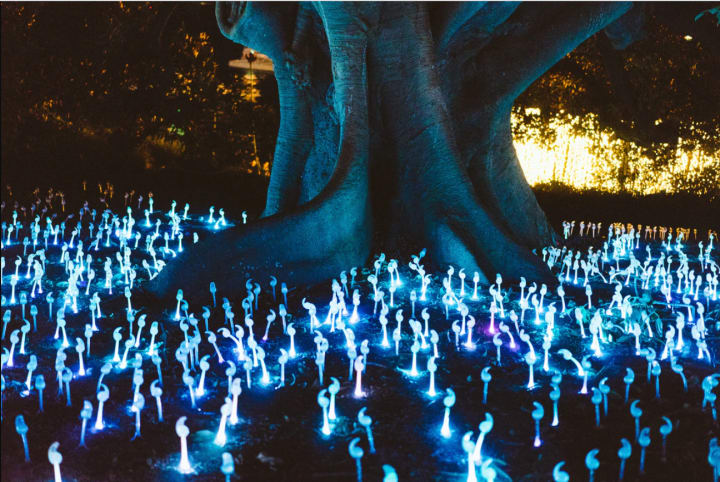VARIANT OF THE VALE
They’d introduced a variant to combat an original threat, but the variant turns out to be far worse than anything imagined.

THERE WEREN’T always dragons in the Valley. Before they came, it was the fairies who’d caused all the mayhem. Small things like blowing freshly washed laundry off clotheslines or ruffling up girls’ dresses with hardly any wind to speak of, might seem trivial compared to overturned wagons carrying much needed supplies to distant villages hard hit by viral epidemics, but they’re all the same when it comes to the mischief these fairies are known for. So that, after a while, given the fact bad things do happen, people began placing blame on them for practically everything imaginable.
And for good reason. These little imps are known for mischief.
I’m Siemen, the Younger. I was just unloading a wagon of my own when the very thought about mischief and fairies occurred to me. Recently, I’ve had my share of unexplained bad luck, so I guess I needed a reason to blame somebody. It’s driving me crazy not knowing whether I’ve been punked. I mean, having lightning strikes set fire to my fields on a clear day or losing two separate wheels in a matter of days as I transport different loads of wheat to my hideaway, was reason enough for the fairies to target me for mischief. Some of their own kind is the reason why I’m having to hide the wheat in the first place, so why then shouldn’t they want to stop or hinder me?
To make sense of this whole ordeal, perhaps I should start someplace where you’ll get an understanding of what’s been happening. This is not my story but Floyd’s. So I’ll try to bring you up to speed as best I can. I know the whole story. It’s not a pretty one. I’ll have to tell you about the emperor’s sudden greed for more gold—"to fund an army to combat the Dark Fairies and the Snow Giants,” he says—and I’ll tell you how he’s enlisted the aid of the fairies’ overlords to spin the gold from wheat. You’ll learn about the peasants’ revolt and how their protest and pleads for help prompted the evil wizard Ugalde to create a variant fairy that seemed to answer everyone’s problems, because it was due to her that the dragons even got here . . . but that – well, I’m getting ahead of myself.
At any rate, Floyd’s story starts like this:
HE WAS STANDING in mud up to his ankles as he stood at the mouth of the cave. Hiding wheat wasn’t something he was used to, so he had to be a little creative when it came to hiding it. For him, this cave’s been the ideal spot. For one thing, because it rains in this area frequently, the ground outside stays wet. Most likely, because of that, he’s certain the overlords’ men might be discouraged to look inside should they be in the area and get suspicious.
With the tip of one boot, Floyd tested the softness of the soil inside the entrance to be sure it could support his weight. The bundles of wheat he came to hide here are heavy, so he doesn’t want to slip and fall. Like most of the farmers in the Valley, Floyd has been forced to hide as much of the wheat for his own personal use and to take to market what he can. An unfair monthly quota by the emperor has placed harsh demands that most farmers find almost impossible to meet. But Floyd did what he was told, despite being forced to hide the wheat he needed. Feeling the weight of the heavy bundle on his back, just now, he inched his way through the darkness to the spot where he keeps his stash. His mind wanders. Floyd sighs, remembering there was a time when life was simpler. Of course, it was way before his time, but he’s heard the stories. Folks talk about how fairies and human came to live together.
Going back and forth carrying the heavy parcels tied with rope, carefully stacking them in place, Floyd nods to himself. He knows the history. In the beginning, back some four centuries ago when the people of the vale first discovered the little elves hiding in the forest, there seemed a mutual attraction that felt almost providential. You could say the fairies needed humans just as much as humans needed them. For one thing, they shared common enemies – the cold of winter, the cruelties of man, but worse of all, the Snow Giants of Maltimore-LeVarSher-Gate who’d often come down out of the mountains just to terrorize the villages for sport. (GoshlinSher, the Valley, is a landmass half the size of China, boasting twenty-seven separate provinces with hundreds of villages, most of whom have been victimized by the Snow Giants). Ask any villager in any shire at the time and they’d give you the same information: people were crazy about the fairies -- and the fairies seemed to like them, too. To begin with, they were like nothing people had ever seen before. These forest creatures were small and incredibly irresistible – the tiny ones no bigger than dry raisins, the size of which you could hold an entire family in one hand, but of the larger ones, with their round bellies and puffy cheeks, were unapologetically the size of pump apples, all of whose glistening green bodies caught your eyes, made you giggle to look at, with huge transparent wings, black eyes, and the cutest pointy ears. They looked like miniature humans that were insects, or else, you might mistake some of them for a child’s toy come to life. But what made them most valuable to the people of the valley was the fact they didn’t mind sharing their magic with them. Smart and friendly, these fairies helped make life better for the peasantries of that day. With the wave of a hand and a word softly spoken, they could turn bad soil good, make murky waters fresh, cure a rash from poison ivy, ferment grapes into wine, or help deliver a breached baby stuck in the womb of its mother. And these fairies knew things about farming, and about cultivating animals, that most skilled farmers never dreamed possible.

Floyd remembered hearing how people sort of took to the fairies right off the bat because they were so helpful and eager to please. So that, over time, it only seemed natural that alliances between humans and fairies would form. And for many, many years, they looked out for each other. Humans and fairies worked good together. But as with all living things, gradually another variation of fairies began to emerge. And with each subsequent generation, the variants grew more stronger in magic, wiser and cunninger in their dealings with men, and they began to change in their physical characteristics. These new fairies were smaller, of a darker greenest-blue hue, and they were mean. They came to be known as Dark Fairies for the coloring of their polished bodies, whose transparent wings sparkled once sunlight bled through them. And because these new mutant fairies craved sex, in short order, they began multiplying like rabbits, soon outnumbering all other species of fairies. They literally became far too plentiful to count or control. And they also had their own forms of mischief.
No one quite understood this variant too much. Perhaps it was because they were by nature solitary creatures, keeping mostly to themselves. You could spot a horde of them sparkling like fireflies, just before nightfall, down close to the river where, the whole crowd of them, behaving like bees, would attack, mutilate, and eat a frightened deer. News of this sort of thing spread fast from village to village, and it wasn’t long before people began fearing for their own safety. Sometimes, when you’ll outside, you’d look up and see them coming, rising like a dark cloud out of the distance, heading straight for you. They didn’t mean any harm. Just having fun, kidding around, but it didn’t feel that way. Within seconds, having surrounded you from head-to-toe, you’ll find yourself in a buzzing, frightful, unexpected deluge of terror, how like a dark kaleidoscope of flies, pestering your very sanity.
This kind of behavior went unchecked for some time, with the occasional disappearance of cattle – and at times, even a person might vanish without a trace--but no one did anything about it. That is, until more stranger things began happening. Whole villages would disappear. Naturally, no one knew what to make of this because no one ever survived to say the Dark Fairies had done it, but the telltale signs were there just the same. For example, had the Snow Giants raided a village, the devastation would have been far different. It’ll be visible for miles, with the wreckage of crashed homes, dead bodies and black plumes of smoke darkening the skies. But to the contrary, these new raids made the villages look as if they’d been magically erased. No standing burnt-out frames of houses, not even a single stone left in place. Nothing left there to indicate a village had been there at all.
An outcry from the villagers soon reached the emperor’s palace, but it was as nothing to him. He turned a deaf ear to their pleads, citing, “It is what it is, because sometimes people move on.” But the onslaught got worse. Getting into the wells and food supplies of some villages, the Dark Fairies turned fresh water to gray mud, full of worms, and the grain and wheat saved would have maggots crawling all through them. A coronavirus began spreading after that. It seemed, at first, the disease would only claim the elderly and physically fragile, but soon, even the strongest of men, and their wives, became infected. They called it the Black Death. People began dying by the thousands. But it wasn’t until the fairies began targeting their children that the people of the villages pooled together to find solutions to the problems plaguing them. Children weren’t just getting sick, some would simply disappear for no apparent reason. It was believed the Dark Fairies were snatching them for food.
As a young mother, Marvulina, at 19, had finally felt she’d found her purpose in life. Her newborn son, Nalino, was her pride and joy. And he was a good baby, hardly ever cried. And after a good feeding, he was almost certain to go right to sleep. That’s what Marvulina was counting on. Having just breastfed her child, she laid him down on soft blankets, tucking him in, and was walking away when something caught her eyes. A twinkle. She whirled around and froze. Her baby was gone. “Noooooooo!” she shrieked, frantically searching through the covers, then under the bed, and it was her screams that brought all her neighbors running. “MY BABY’S GONE!” she yelled. “THEY’VE TAKEN HIM!”
This same sort of scene played out in various places throughout the Valley. Children went missing, never to return.

“We demand justice!” was the clamor the protesters made in the streets of Zor, the capital city, a few weeks later. “Help us find our children! Save us from these Dark Fairies!”
There in his Crystal Palace, on a high cliff overlooking the city, the emperor watched the crowds swelling larger everyday -- people from every corner of the Valley, pouring in by wagonloads in the hundreds of thousands. Most of them knew they were leaving their homes vulnerable to attacks, for reports of new assaults by both Snow Giants and Dark Fairies kept coming in. The people demanded help.
“What do they want me to do?” the emperor asked his advisers. “I’m no magician. I can’t make the giants and fairies go away! I CAN’T bring their children back.”
The emperor’s advisers nervously told him what they think he should do: he’ll need to build himself an army.
“An army?”
“Yes, your highness,” they said, “and to raise an army you’ll need gold – lots of it! Gold for military equipment; gold for payment to the troops; gold to pay for your protection of the villages.” And their counsel was pleasing to the emperor, for he’d heard about a strange set of fairies who could spin gold out of wheat. The only problem was these fairies had an unusual fetish – an appetite for eating little boys. So the emperor proposed a secret scheme to employ these fairies and to “Give them whatever they want, at whatever cost! JUST GIVE ME MY ARMY!” he demanded.
Thinking back on it now, Floyd remembered how a season of great distress followed. More children went missing. The Snow Giants made indiscriminate invasions. More villages continued disappearing. And a quick but certain revolt occurred when clandestine gangs of people made attacks on the shipment of wheat being delivered to the warehouses where fairies worked, spinning gold; they set fire to ships bringing tea and silks and other niceties to the royal family—and unrest continued to spread like wildfire. In Zor, as the crowds grew thicker, protesters marched with pitchforks and shovels waved overheads like banners, demanding justice for their children, protection for their villages and food, they were being slowly starved to death having to surrender their wheat as payment for the emperor’s army. Of course, the emperor didn’t listen to their demands. In fact, he responded with a show of force, sending in armed knights with smothering smoking lanterns, dashed on the pavement and thrown loosely into the crowds to disperse what he called an angry mob. It was in that moment the people saw the true face of injustice diffidently masked as a “friend of the people,” when the emperor himself cleared the streets for a public display of empathy by personally laying a single rose at the foot of a makeshift memorial erected to honor the slain children.

During this period, most people wore cloth masks, too afraid to breathe the air, and the emperor’s campaign for law and order only seemed to promote more lawlessness.
“THESE ARE THE most troubling times,” Floyd was saying out loud, so used to talking to himself, a sign that he spends too much time alone. He was just settling the last bundle of wheat in place, saying, “If something isn’t done fast, I think—” but he stopped short of completing his thought when suddenly the light at the entrance of the cave went dark. He paused and looked up.
A silhouette of a man stood there.
Busted! was Floyd’s thought. He knew sooner or later they’d catch up with him. Dropping his head, he raised his hands and stepped forward—and paused.
There stood a champion spirit, clad in brilliant white, flashing a golden sword. He stood at the mouth of the cave with his sword drawn.
“To you I’ve come bearing a message,” the spirit began.
“Who, me?” Floyd was terrified, and like all occasions when he’s nervous, he tends to talk too much. “Whaddayawanna tell me? It won’t do any good . . . I don’t know anybody! I can’t do nothing. I’m just a simple farmer. Nobody’ll ever believe me! ... I don’t even have enough wheat saved to meet my monthly quota … The emperor’s demands, the gold he wants—"
“Listen to me,” said the shiny being. “A great war is coming, and you have been selected to lead the GoshlinSher to victory. I’ve come to give you a message. Go to the riverbank at Camarish and walk along the sandy shore. You shall find a talking fish near the water. Go to her; her name is Teddi. I have put my words in her mouth. She shall tell you what you must do.”
Floyd began at once to make excuses. “You’ve got to be kidding me, right? I’m just a kid. I can barely say my own name. No one’s gonna listen to me. M-My family’s poor . . . I don’t even know who my representatives are at the Capitol!”
But there was no ignoring this magnificent spirit.
“Go in this thy strength, dear warrior,” he said. "Teddi shall tell you what you must do.”
“A talking fish?” Floyd began. He chuckled slightly to himself. “No one’s ever heard of a talking fish. Surely, you take me for a fool… You’ve got the wrong pers—” and in the blink of an eye, the spirit was gone.
But later that very day:
“I was told you will tell me what I must do to rid the Valley of the Dark Fairies, and Snow Giants,” Floyd said as he stood with waves breaking over his ankles. The orange and white fish that looked at him laid on its side on the bank in the tiny splash of waves, and at first appeared to be just a fish out of water. Floyd had happened upon the fish by chance and had almost walked right by. Then it spoke: “You will know what you must do when the answer comes to you.”
“Comes to me?”
“Yes,” said the fish, “The answer’s already inside you. You’ll just need to bring it out. Show it forth and answer it.”
“What?” said Floyd, squatting down next to the fish.
“Get alone to yourself,” the fish continued. “Think and pray. It will come to you. And when it does, write it down. Keep it before your eyes until you’ll completely consumed by it. Then, everything necessary to get started to complete your work will began happening for you.”
Floyd stood up and took a few steps away and was silent, thinking about what this magical fish just said. Then he remembered something. “Say,” he was saying, with the words still in his mouth as he spun round just in time to see a big wave wash in and snatch the fish out of sight, “why do they . . . call . . . you -- Teddi?”
It would be another month before he talks with Teddi again.
SOMEONE SAID IT, no one in the crowd of protesters knows exactly whom, but they’d said the best way to fight magic would be with magic . . . and a certain name flashed through the crowd like lightning on every tongue. The name of a wizard known for his powerful magic but infamous deeds—Ugalde!
In the Valley, Ugalde was a name that most people knew because just mentioning it could conjure up bad memories.
His was a past smeared with blood. But people tend to forget things after a while; almost as if they’d afraid to acknowledge the pain he’d caused. Take for example the Lindorfshire incident. There sixty-three villagers lost their lives when Ugalde cast a spell of invisibility to protect them from Mog, the one-eyed giant, whose invading army laid waste to their village. The spell worked, rendering the villagers amazingly invisible—but things went awry quickly. Once Mog had gone, Ugalde returned to reverse the spell. But the instant the villagers’ bodies began to appear, the thin rays of sunlight shining down through the trees began frying them like scrambled eggs. In the end, nothing was left of the people except sixty-three bloody pulps scattered in pieces on the ground ... And then there was the SwaggerSher twins, babies who were having problems keeping their mother’s milk down. Ugalde worked a spell that gave the twins the ability to suck and retain their food—and it, too, worked wonderfully. Everyone was happy. But four days later the mother found the twins dead—one with the foot of the other baby down it’s throat, and the other baby with his brother’s entire hand and arm down his throat. It looked as if they were trying to swallow one another whole. And a third incident happened, but no blame has ever been pointed at Ugalde, but everyone knows he was responsible just the same. It involved an eleven-year-old girl named Connie. The child had a pet goat that people complained and said was possessed by devils because it could make noises that sounded like words. The day came that villagers took matters into their own hands to rid themselves of the cursed animal and in the child’s distress she had ran up to Ugalde to plead for help. He was well known in those parts for his charitable works and greatly respected, so he seemed someone of authority to turn to. At the time, by chance, he and a servant were passing through the village on their way to another province. It is said, upon seeing Ugalde, the child came running towards him but tripped, catching hold to a sleeve of his robe as she fell, almost ripping it completely off. The old wizard was unscathed by the event, naturally, but some say they saw a look in his eyes they’d never forget as he eyeballed the child. Of course, nothing was done to save the goat, and when the village demanded the child’s father be the one to purge the curse away by killing the animal, he consented. It was his very pitchfork that stabbed the goat, and everyone gathered around the dead pet, horrified. Lying in the hay, with the goat’s rope around her neck, and three huge stab wounds gushing blood, was Connie. By some form of magic, the child had taken the goat’s place.
Memories like these were in Ugalde’s past, but, it seemed, just now, they didn’t matter anymore. The people needed his help.
His place of residence wasn’t far from Zor.
STONE-TERROR CASTLE
THERE WERE swollen, pitiful faces in the crowd that day, standing outside Ugalde’s castle walls. From a high window he could see them and knew what they wanted. The old castle loomed massive under dark clouds and looked spooky. Ugalde knew he couldn’t ease the pain of these people, and really didn’t care to. The death of children mattered little to him. Even before he allowed his servants to open the gates to let them in, he’d already made up his mind what he wanted in return for his services. But he’d decided not to tell them—yet.
“You mean, you will help us?” said a toothless man, with a woman whose face was dirty and looked pitiful, leaning on his arm. “We lost our daughter. She was only four.”

“I cannot promise the return of those children already taken,” he said, “but I’ll see to it that no others will suffer the same fate.”
The people huddled in agreement.
“How do you stop bad fairies?” Ugalde says, and a wicked smile crept into the corners of his mouth. “You fight fire with fire!”—but just what he meant by that the people didn’t understand, but they didn’t question him either.
What will he do? was the question the villagers asked each other as they left Ugalde that day. And he didn’t tell them his fee—what kind of payment he’d be expecting from them, but somehow the people knew that whatever the cost, large or small, they would pay it.
Soon after the people had gone, Ugalde stole into the forest under the cover of night and by chance trapped a handful of Dark Fairies in a prism of light. At his castle he kills them like smashing bugs; and working a spell, he stirs their purple blood in a wizardly soup, in a sow’s severed head.
A flash of light. A clap of thunder. Then it was as though the entire room spun round. Then in the darkness, silence.
Ugalde called for a light.
The young thing that he had made stood before him and looked human. Though made from the very creatures he sought to destroy, she looked so innocent. A blond girl of eighteen perhaps, unclothed but unaware that she is naked. She tries her legs, and they give out under her. But discovering she has wings . . . thin, nearly invisible wings, she flaps them. They lift her up.
Suddenly, then, the room is flooded with a blinding light. The lantern! Ugalde thinks, is it about to explode? But no, it’s not the lantern. He saw then that the light came from the girl.
He called her name Sparkle.

Within days, word of the variant spread throughout the Valley. With the threat of the Dark Fairies mounting, even then something miraculous began to happen. The fairies start dying off by the droves, dropping dead like flies. An old farmer checking on his cattle one day, finds a heap of them dead by a fencepost, and piles of others scattered across the ground. They look like dried up blackberries.
It seems that, whenever Dark Fairies comes in contact with Sparkle, automatically something sucks the life out of them into her.
Of course, this greatly upset the Dark Fairies. And they knew exactly whom to blame.
THE CHASE through Echo Forest was maddening. The Dark Fairies intended to kill Ugalde. Even as powerful as he was, he felt totally helpless against their rage. He left Stone-Terror Castle running for his life. Marek, his horse, was no Pegasus. He had no wings, no magic, but his legs were his gift, and his power was speed. You could feel the thunderous crashing of hoofs as the massive animal kicked up moss and dirt, a cloud of sand. There were fairies everywhere. And it wasn’t long until they’d cornered Ugalde in an ambush. Knocking him and his horse to the ground, they swept in for the kill. They were shredding them to pieces, pulling them a part, flesh, and bone, with sinew and blood flying when a great explosion occurred.
What had happened was that the dark magic that gave these fairies their life was the very dark force that now fueled the birth of a whole new creature. One that had been locked away inside the old wizard.
The Dark Fairies scattered instantly. The blast had been so powerful it left a huge crater in the ground and sent everything flying. Trees were flattened, lying on their sides.
Hovering in the air, then, was a beautiful lady in black. She seemed amazed, at first, not knowing herself, looking down at her hands, at her body . . . and realizing what just happened, smiled. Ugalde was reborn into the woman he knew he was always meant to be, the woman who had lived trapped inside his male body all his life -- Aurora Borealus, Phantom of the North.

About the Creator
Jyme Pride
Ever the dreamer, I live to imagine and inspire. Professor, artist, former news reporter...I always say, "Magic is in the details of life." This is my story. Now tell me yours.
Reader insights
Outstanding
Excellent work. Looking forward to reading more!
Top insights
Compelling and original writing
Creative use of language & vocab
Easy to read and follow
Well-structured & engaging content
Excellent storytelling
Original narrative & well developed characters
Eye opening
Niche topic & fresh perspectives
Masterful proofreading
Zero grammar & spelling mistakes






Comments (5)
Awesome read! Thank you for sharing! You have quite a world developed, I wish I could create something even half as magical :)
This was a great setup for a full novel. The multiple POVs didn't distract from the story at all. It was great having insight from different perspectives. Though after Floyd's story began, I was a tad confused if his story ran parallel to Siemen's story or did it happen in the past. But overall great introduction. I enjoyed your entry so much this didn't feel like a 5000-word story. I must admit, I was disappointed it ended so soon, I wanted to see how Siemen fits in and Aurora's plans now that she's free. Hopefully, you can post additional chapters!
Awesome world building and story. Can’t wait to see where it goes. There is so much more here than one chapter already. 🥰
I enjoyed how imaginative this story was, though I did struggle briefly with the POV change from Siemen to Floyd. Ugalde is such a cool character, and I really like how there are consequences to the magic in your world. It created stakes and tension and emotion, so when you introduced the city of Zor, my reaction was immediately like, NO! Don't help them Ugalde! Hahah. Great work Jyme!
I'm not sure where to begin...I have read only one other story that made me feel like I was on a roller coaster through Alice's Wonderland but I think you did that then tacked on Dante's Inferno. Just wow. As I was reading, the run on sentences seemed more a stylistic choice rather than a writer's habit. The narrative flow from one section to the next seemed more intentional and less like a digression from the story to load information on the reader. There were a few points where the words would change from past to present tense in the same paragraph so I was a little confused as to whether this was supposed to be Siemen telling events as they happened or as they were unfolding. Then as I was reading and came across words like "coronavirus" and "the Black Death" I wasn't sure if this was supposed to be one big metaphor or a tongue-and-cheek heavy, fantasy fiction. Whatever this ultimately was for you, it was entertaining to me. You have some great imagery throughout the piece and I love the way you added more pictures to your story. Well done!!